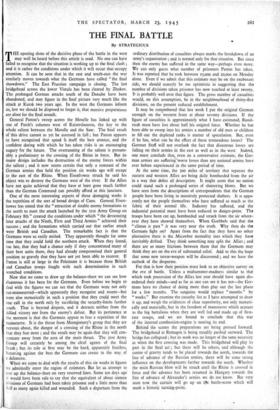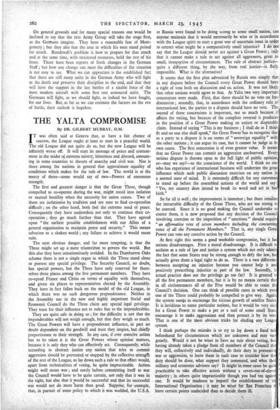THE FINAL BATTLE
By STRATEGICUS HE opening shots of the decisive phase of the battle in the west may well be heard before this article is read. No one can have failed to recognise that the situation is working up to the final clash ; and it is rather the conditions under which it will occur that occupy attention. It can be seen that in the east and south-east the war similarly moves towards what the Germans have called "the final showdown." The East Prussian campaign is closing. The last bridgehead across the lower Vistula has been cleared by Zhukov. The prolonged German attacks south of the Danube have been abandoned, and may figure in the final picture very much like the attack at Kursk two years ago". In the west the Germans inform us, lest we should be disposed to forget it, that massive preparations are afoot for the final assault.
General Patton's sweep across the Moselle has linked up with one of Patch's columns west of Kaiserslautern, the key to the whole salient between the Moselle and the Saar. The final result of-this drive calm& as yet be assessed in full ; but Patton appears to have recognised that speed is itself the best armour, and the confident daring with which he has taken risks is an encouraging augury for the future. The overrunning of the salient is presum- ably a preliminary to the crossing of the Rhine in force. But its major design includes the destruction of the enemy forces within the salient ; and it now seems certain that only a remnant of the German armies that held the position six weeks ago will escape to the east of the Rhine. When Eisenhower struck he said his object was to destroy the Germans west of the river. If the Allies have not quite achieved that they have at least gone much farther than the German Command can possibly afford at this juncture.
One of the most interesting aspects of these damaging weeks is the repetition of the sort of broad design of Caen. General Eisen- hower has stated that the "attraction of Sizable enemy formations-to the north to meet the attack launched by the '21st Army Group on February 8th" created the conditions under which "the devastating later attacks of the Ninth, First and Third Armies" achieved their success ; 'and the formations which carried out that earlier attack were British and Canadian. The remarkable. fact is that the Germans were so easily misled. They apparently thought for some time that they could hold the northern attack. When they found, too late, that they had a chance only if they concentrated many of their best units there, they had already compromised their general position so gravely that they have not yet been able to recover. If Patton is still at large in the Palatinate it is because those British and Canadian troops fought with such determination in such wretched conditions.
Now that we come to draw up the balance-sheet we can see how disastrous it has been for the Germans. Even before we begin to deal with the figures we can see that the Germans were not only out-manoeuvred—which apparently they recognise and resent—but were also numerically in such a position that they could meet the one- call in the north only by sacrificing the security-limits further south. That is beyond dispute, and it detracts neither from the Allied victory nor from the enemy's defeat. But its pertinence at the moment is that the Germans appear to fear a repetition of the manoeuvre. It is the threat from Montgomery's group that they are nervous about, the danger of a crossing of the Rhine in the. north that they fear most ; and the result may be again that they will con- centrate away from the area of the main thrust. The zrst Army Group will certainly be among the chief agents of the final break ; but its role at first may be the hard, apparently fruitless, battering against the best the Germans can create in the wayi of a defensive.
When we come to deal with the results of this six weeks in figures We admittedly enter the region of estimates. But let us attempt to cast up the balance-sheet on very reserved lines. Some ten days ago' it would have been safe. to say that the equivalent of about sixteen divisions of Germans had been taken prisoner and a little more than half as many again killed and wounded. Such a departure from the ordinary distribution of casualties always marks the breakdown of an army's organisation ; and is normal only for that situation. But since then the enemy has suffered in the same way—perhaps even more. We can only gucss what number of prisoners Patton has taken. It was reported that he took between 15,000 and 20,000 on Monday alone. Even if we admit that this estimate may be on the exuberant side, we should scarcely be too optimistic in suggesting that the number of divisions taken prisoner has now reached at least twenty. It is probably well over that figure. The gross number of casualties would, on this assumption, be in the neighbourhood of thirty-five divisions, on the present reduced establishment.
It may be remembered that last week I put the original German strength on the western front at about seventy divisions. If the figure of casualties is approximately what I have estimated, Rund- stedt must have lost about half his original force. Whether he has been able to sweep into his armies a number of old men or children to fill- out the depleted ranks is matter of speculation. But, even if he has, what can be the effect of these tremendous losses? The German Staff will not overlook the fact that disastrous losses are falling on their armies in the east as well as in the west. Indeed, one must conclude that even on a conservative estimate, the Ger- man armies are sufferineworse losses than any national armies have ever before experienced in the same period of time.
At the same time, the 300 miles of territory that separate the eastern and western Allies are being daily bombarded from the air in a way that defies all description. It might seem that no nation could stand such a prolonged series of shattering blows. But we have seen from the descriptions of correspondents that the German people have been living in massively protected shelters. It is appa- rently not the people themselves who have suffered so much as the fabric of their normal life. Industry has suffered, and the industrial potential must ,have been reduced to danger-point. The troops have been cut up, bombarded and struck from the air where- ever they have showed themselves. When Goebbels said that the "climax is past" it was very near the truth. Why then do the Germans fight on? Apart from the fact that they have no other alternative there is the Micawber mentality into which they have inevitably drifted. They think something may split the Allies ; and there are so many frictions between them that the Germans may think they are on the eve of substantial relief. Add to this the hope that some new terror-weapon will be discovered ; and we have the outlook of the desperate.
For that is how their position must look to an objective survey on the eve of battle. Unless a midsummer-madness similar to that which took possession of the Allies last year should have again dis- ordered their minds—and as far as one can see it has not—the Ger- mans have no chance of doing more than play out the last phase for a few months. The sanguine would replace " months " by "weeks." But examine the casualty list as I have attempted to draw it up, and weigh the evidences of clear superiority, not only numeri- cally and materially, but in the freedom of manoeuvre which accrues to the big battalions when they are well led and made up of first- rate troops, and we are bound to conclude that this war of the internal combustion-engine is nearing its end.
Behind the scenes the preparations are being pressed forward. The bridgehead at Remagen is being steadily pushed outward. The bridge has collapsed ; but its work was no longer of the same necessity as when the first crossing was made. This bridgehead will play its part in the final act ; but there will be others, and although the centre of gravity tends to be placed towards the north, towards the line of advance of the Russian armies, there will be some strong influence on the developments farther towards the south. Whether the main Russian blow will be struck until the Rhine is crossed in force and the advance has been resumed in Hungary towards the line of advance of Alexander's armies we do not know. But very soon now the curtain will go up on the battle-scene which will mark a historic turning-point. On general grounds and for many special reasons one would be inclined to say that the 21st Army Group will take the stage first, as the Germans imagine. They have a reasonable fear of Mont- gomery; but they also fear the area in which his men stand poised for attack. Rundstedt's problem is how to prepare for that attack and at the same time, with straitened resources, hold the rest of his front. There have been reports of fresh changes in the German Staff ; but how any change can meet the difficulties of the situation is not easy to see. What we can appreciate is the established fact that there are still many units in the German Army who will fight to the death and preserve their discipline to the end, and that they will have the support in the last battles of a sizable force of the most modern aircraft with some first rate armoured units. The Germans will fight, as we should fight, as indeed we have fought, for our lives. But, as far as we can estimate the factors on the eve of battle, their outlook is hopeless.



























 Previous page
Previous page